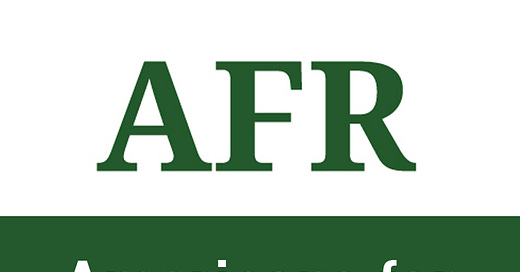AFR's Banking Crisis of '23 Brief: 4th Edition
A cogent email of curated information on the banking crisis and the response
March 29, 2023
TO: Interested parties
FROM: Americans for Financial Reform
RE: Banking Crisis of '23 Brief: 4th Edition
Barr, Gruenberg, and Liang at House Financial Services:
New facts from the witnesses were few. The members gave a sense of the political dynamics. Republicans really like regulatory/supervisory crackdowns now (except for the new capital rules) and see no need for new rules. Democrats are happy to agree with them on that first part, while wryly noting prior Republican calls for less enforcement and regulation.
Like yesterday in the Senate, Barr seemed unwilling to criticize his predecessor Quarles in explaining why supervision was not tougher in an exchange with Rep. Barr (R). Fed vice chair Barr referred to the Fed’s 2019 implementation of S.2155, and left us to fill in the blank that Quarles did not use the discretion Congress gave the Fed for enhanced supervision.
This discretion was the “legislative fool’s gold” of which Bloom Raskin warned in 2018. Fed rules on S.2155 tied supervisory hands, as did the Quarles “guidance on guidance” regulation. Garbarino (R) reminded us that Gruenberg and Lael Brainard supported that rule. (Did you know Quarles has contributed over $115,000 to various Republican causes?)
McHenry (R) engaged in a rapid-fire Q&A about what the three witnesses knew and when in the days before Sunday, March 12. It’s worth a watch here, a few minutes in. Other remarks made clear he is driving at how SVB went from being “idiosyncratic” to “systemic” in a few days.
Reminder: McHenry signed a letter in 2018 saying, “Powell stated that financial institutions with less than $250 billion in assets generally do not present a systemic risk to the economy, and we agree with that view."
McHenry and others also want to talk about a “digital bank run,” which seems to drive at a no-changes response. “It was the Twitter/Reddit-run, not S.2155 or Trump-era deregulation.” (Corporate treasurers with billions in their accounts are not relying on social media, and this bank run happened because people were rightly worried about capital and liquidity there.) Barr seemed to suggest this issue would fall under the Fed’s “novel supervision group,” and Liang said they’re examining the issue. Gottheimer (D) raised the issue too.
Waters (D) said,“I’m heartened by how much agreement there was [today]. I heard Republicans argue for our bank regulators to be more aggressive in their bank supervision.” She wants “legislative reforms.” Himes (D) observed that Republicans “spend all their time trying to denigrate and defund” regulators until they start demanding they crack down. Garcia (D) extracted a clear “no” that ESG/DEI had nothing to do with SVB collapse. Sherman (D) exhorted the Fed to toughness: “You are not running a consulting organization. You are running a regulatory organization that can force banks to act.” Vargas (D) said “Where was the stick?” Meeks (D) provided historical context: “We are a long way away from where we were in 2008. Thank God, we had Dodd-Frank.”
Luetkemeyer (R) pressed Barr on why the Fed did not enforce MRAs and MIRAs. The Fed communication to SVB seems to have been only an MRA. (One expert texted us that this is “absurd” that such a major risk would not be a MIRA.)
Waters (D) wants to hear more about “the role that venture capital played” in the decision to rescue SVB’s uninsured depositors. Wagner (R) claimed that SVB shows we don’t need the Basel endgame capital rules because “trading risk” did not play a role in its collapse, which is odd since the trading aspects of those rules are aimed at Wall Street megabanks.
Foster (D) and Hill (R) both pressed Barr to consider contingent capital instruments, of the sort Switzerland imposed and are now a focus of debate in the Credit Suisse case. He responded to Foster that the Fed has floated a proposal for a species of this idea (there was also an FSOC study back in 2012) and said he would consider other ideas.
Pressley pointed the finger directly at the bank lobby, Republicans and Trump on S.2155. Tlaib scolded the regulations for not having implemented Section 956 of Dodd-Frank on executive compensation, and Gruenberg said they would investigate bonuses and finish 956. She pleaded for more outrage aimed at bank executives too.
Mergers. The right continues to push a narrative (WSJ here, McHenry here) about merger-skeptical Biden administration and regulators being responsible for the SVB failure, and noting the $20 billion cost to the Gruenberg gave a firm “no” to the question of whether the White House pressed on that point.
Deposit Insurance. “We will be keenly sensitive to the needs of community banks,” Gruenberg said. He promised to use the authority they have in imposing the new fees the FDIC will impose. Liang filibustered questions about Yellen’s muddled messaging on how broad deposit guarantees are right now, but said “contagion in the broader system” is the key consideration.
The Fed report. Barr said the Fed will release underlying materials that it uses and that it gives the GAO to conduct its investigation. He made clear the question of why SVB matters were not escalated more quickly is a key one for the report.
Signature. Gruenberg said Signature “barely” met its obligations on Friday, March 10, leading to the decision to close it on Sunday. That seems a riposte to former Rep. Barney Frank, who said regulators seemed to want to send a message about crypto.


